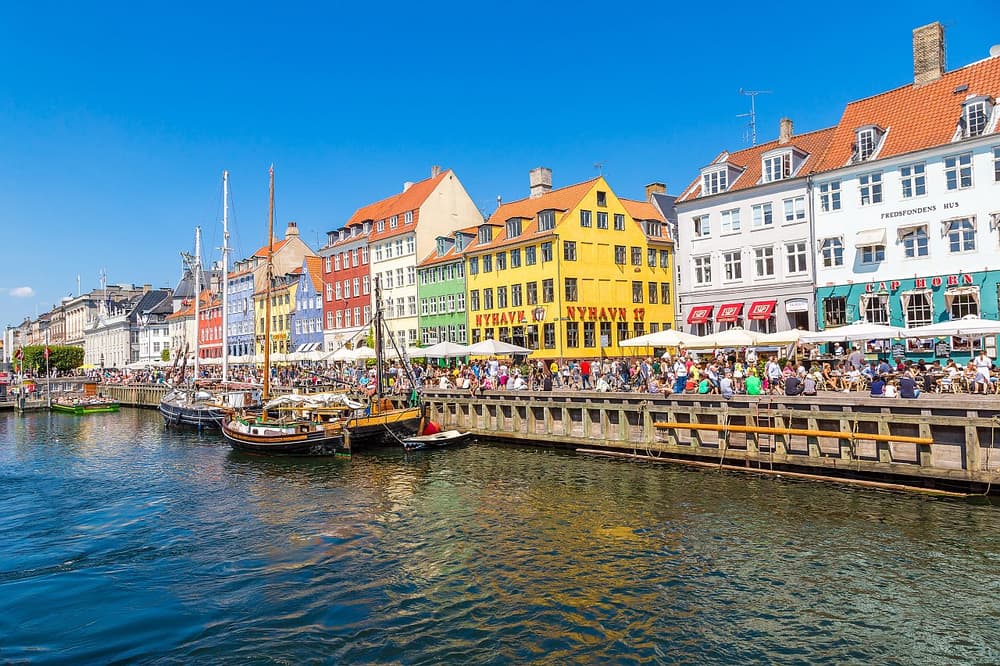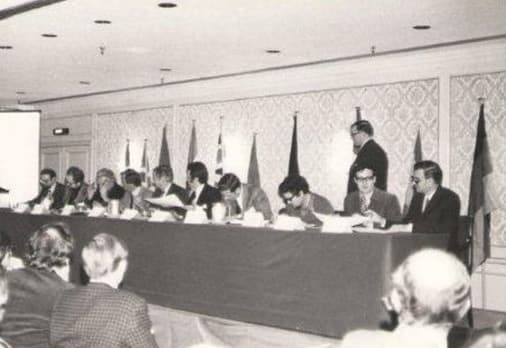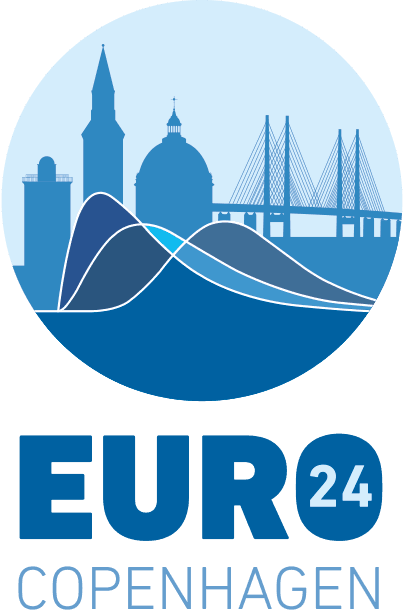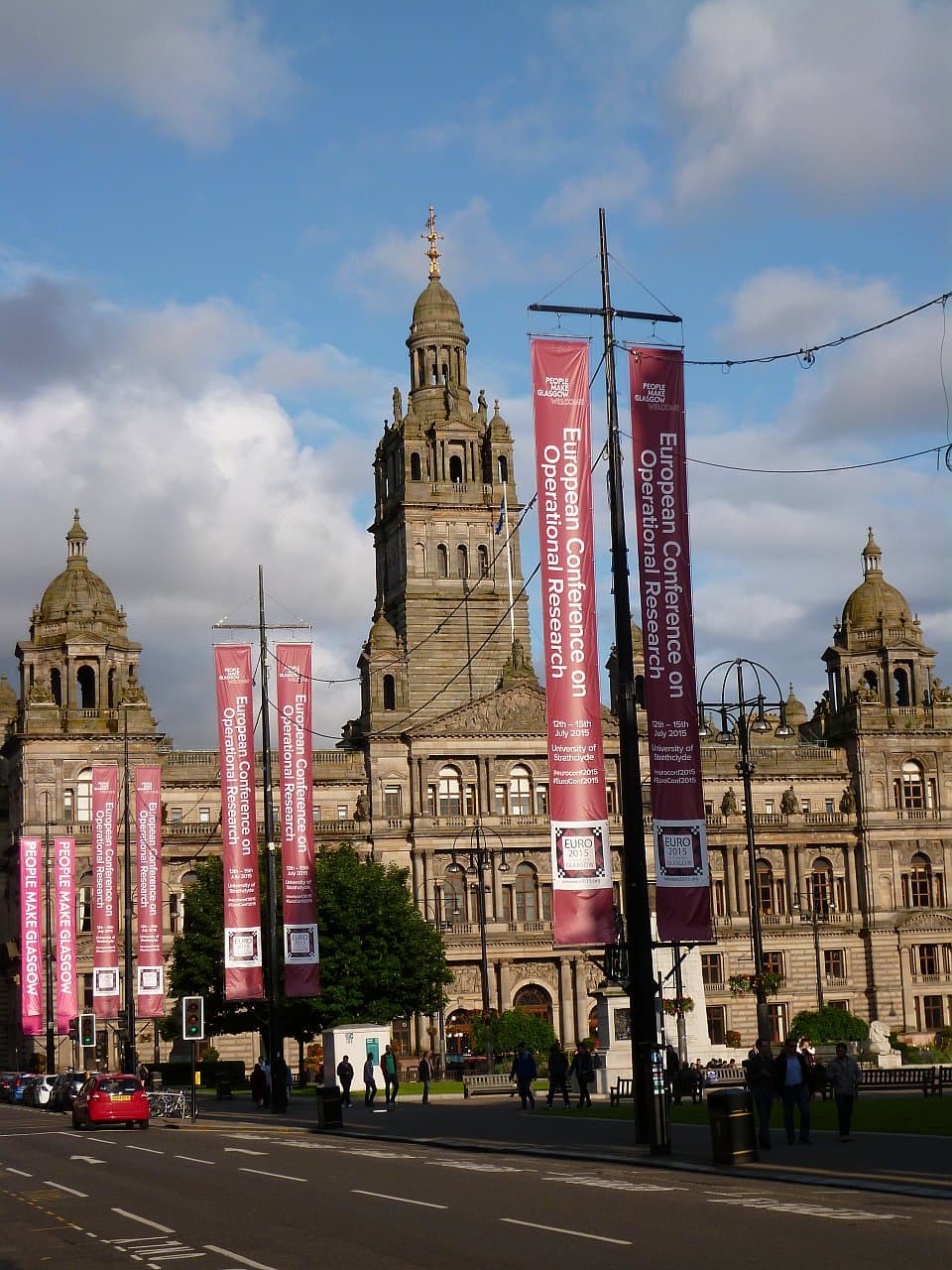Later this year, from 30 June to 3 July, the 33rd European Conference of Operational Research will be hosted in Copenhagen, Denmark at the Technical University of Denmark (DTU) on behalf of EURO.1https://euro2024cph.dk That straightforward statement begs, for many readers, at least two questions: What is operational research? And what is EURO? Maybe there is a third: Why is this being included in the Magazine of the European Mathematical Society? I hope the answer to the first question will also answer the third.
Nyhavn, Copenhagen.
©DIS Congress Service, Copenhagen / All rights reserved.
Operational research
The term operational research (OR) was first coined in the late 1930s in the UK, as preparation was made for war. Many scientists had been called from their university laboratories to aid the war effort. Amongst these was Patrick Blackett, professor of physics at the University of Manchester, known for his work on cloud chambers and cosmic rays, who was to be awarded the Nobel Prize in Physics in 1948. During the Second World War he made a major contribution advising on military strategy using a scientific approach to the solution of problems that were faced. He was director of Operational Research within the Admiralty from 1942 to 1945 and is known, certainly in the UK, as the father of operational research.
The scientists used no formal OR methodology during the war, as none existed. Their approach involved collecting real data about operations and analysing it using statistical and mathematical methods, simply applying their scientific approach. After the war new analytical areas evolved within OR, most notably linear programming, which developed into various forms of mathematical programming. Other approaches now in the OR analysts’ tool bag include simulation, game theory, queueing theory, network analysis, decision analysis, and multicriteria analysis. All these have powerful application to practical problems with the appropriate logical structure. However, it is not only mathematical, analytical, methods that are in the tool bag. Most of the problems tackled by OR are messy and complex, so a systems approach is frequently required, and methods of problem structuring, such as soft systems methodology, are often used.
Operational researchers are concerned to enable decision-makers to make better decisions. OR is used by organisations of all sizes, including businesses across all industry sectors, government and other public sector bodies, charities, communities and even individuals. OR helps inform strategic, tactical, and operational decisions as well as assisting in the design of public policy.
An idea of the range of problems that are tackled by OR can be found by considering the six finalist presentations of the 2021 EURO Excellence in Practice Award at EURO 31 in Athens, a hybrid conference, the last time the award was made. Two, both from the UK, concerned health. The winning project investigated emerging health threats, such as the coronavirus global pandemic, which create extensive health, economic and social problems. A key challenge for health experts and policy-makers is deciding how to balance and reduce the risk of these threats. The use of OR models and processes by health experts and policy-makers enhanced the quality of health experts’ recommendations to the leadership of the UK Department for Environment, Food and Rural Affairs in the prioritisation of animal and human emerging health threats and informed new international standards for the Food Standards joint programmes of the Food and Agriculture Organization of the United Nations and the World Health Organization. The second concerned shaping demand for urgent care, via an app to inform patients of alternative facilities for care.
Three finalist entries concerned a variety of transport applications: airport staff scheduling at Swissport International, truck drayage dispatching and appointment booking in the Port of Hamburg, and the transformation of Italmondo’s cargo loading operations. The sixth finalist sought to increase safety during the Hajj.
Euro
After the Second World War, many of the scientists in the UK, including Blackett, returned to their university laboratories. Others, however, stayed in the defence sector, or went into private or nationalised industries to practice OR. An OR Club was formed in 1948, which later became the Operational Research Society (ORS). OR societies were also formed in other countries. In 1957, an international conference was held in Oxford, England, following which the International Federation of OR Societies (IFORS) came into existence in 1959. The immediate main activity of IFORS was the organisation of triennial international conferences for the world community of operational researchers. Following Oxford, the next two were held in Europe: in 1960 in Aix-en-Provence, France, and in 1963 in Oslo, Norway.
Understandably, the IFORS conferences moved out of Europe – firstly to the USA in 1966. At the 6th IFORS conference (Dublin, 1972), the participating presidents of European OR societies realised that there would not be a conference in Europe for a further nine years and, having discussed the situation, agreed to consider setting up a European coordinating body [8 H.-J. Zimmermann, The founding of EURO, the Association of European Operational Research Societies within IFORS. Eur. J. Oper. Res. 87, 404–407 (1995) ]. At a meeting of representatives of European OR societies, held in Amsterdam on 3–4 May 1974, two major decisions were made: to formalise and institutionalise increased European cooperation, drafting an agreement between the European OR societies, and that there should soon be a European Conference on Operational Research.
This conference was held in January 1975 in Brussels, Belgium, hosted by the Belgian OR Society, with the OR societies of Denmark, Germany, United Kingdom, Norway, the Netherlands, and Sweden helping with finance. The objective of formalising closer cooperation amongst the European operational researchers was achieved at the conference: ten European OR societies (of Belgium, Denmark, Finland, Germany, Great Britain, Greece, Ireland, the Netherlands, Sweden, Switzerland) gave birth to EURO, The Association of European Operational Research Societies within IFORS, by signing an agreement.
Signing EURO into existence at EURO I, Brussels 1975.
©EURO / All rights reserved.
On 8 March 1976, in a circular letter to all European OR societies, the honorary secretary announced: “I hereby declare that EURO, The Association of European Operational Research Societies within IFORS, is now formally constituted with effect from 5 March 1976” [5 G. K. Rand, Forty years of IFORS. Int. Trans. Oper. Res. 8, 611–633 (2001) ]. By 18 June 1976 “the definitive statutes and by-laws of EURO were ratified in total by the OR societies of: Belgium, Denmark, France, Germany, Greece, Ireland, Italy, The Netherlands, Spain, Switzerland and the United Kingdom” [4 J. P. Brans, EURO bulletin 6. Eur. J. Oper. Res. 1, 69–71 (1977) ].
EURO / All rights reserved.
The membership of EURO has increased as more European national societies joined IFORS and countries outside Europe which joined IFORS, but where there was no regional grouping, also became part of EURO. There are now 31 member societies within EURO, including Israel, South Africa, and Tunisia.2https://www.euro-online.org/web/pages/1457/current-member-societies
The idea of starting a European journal was raised in the first meeting in Amsterdam in 1974. The first issue of the European Journal of Operational Research (EJOR) appeared in 1977, a month after the second EURO conference. Since then, it has continuously grown in terms of reputation and quality (through measures such as the impact factor) to be one of leading journals of the international OR community.
EURO conferences
As mentioned previously, the first European Conference on Operational Research (EURO I) was held in Brussels in January 1975, only nine months after the 1974 Amsterdam meeting. That there were 506 participants is a tribute to the commitment of all those who participated in the preparatory work.
Following the success of EURO I, a second conference was held in Stockholm in 1976. In 1977, EURO co-sponsored an Institute of Management Science (TIMS) international meeting, held in Athens, Greece. Other conferences have been held jointly with TIMS: in 1982 (Lausanne), 1988 (Paris), 1992 (Helsinki) and with INFORMS (created by the merger of TIMS and the Operations Research Society of America) in 1997 (Barcelona), 2003 (Istanbul), and 2013 (Rome). The last-mentioned conference attracted over 3500 participants, but before the coronavirus pandemic, there were typically 2500 participants.
Observant mathematicians will have noticed the contradiction between EURO I in 1975, the first annual conference, and the fact that the conference in 2024, some 49 years later, is the 33rd. IFORS hold a conference every three years. EURO, as a regional grouping of IFORS’ member societies, does not hold a conference in that year, hence the discrepancy. I have been privileged to attend 24 EURO conferences: Copenhagen will be my 25th.
EURO / All rights reserved.
22 member societies have hosted the conference. The UK Operational Research Society has hosted the conference three times, twice in Glasgow, and is due to host it a fourth time in 2025, in Leeds, when the 50th anniversary of EURO will be celebrated. In addition to Glasgow, the conference has been held twice in Brussels, Lisbon, and Helsinki. Other societies to host the conference twice are those of Greece (in Rhodes and Athens), Spain (in Barcelona and Valencia), Italy (in Bologna and Rome), Germany (in Aachen and Bonn), and the Netherlands (in Amsterdam and Rotterdam). Surprisingly, of the twelve societies ratifying the statutes and by-laws of EURO in 1976, one has never hosted a conference: Denmark. That anomaly is being corrected this year. It may be confusing that the conference logo refers to the year and not the sequence number of the conference.
EURO 27 Glasgow 2015.
🅭🅯 CC BY 4.0EURO Gold Medallists
One of the features of the conferences is the award of the EURO Gold Medal, the highest recognition in Europe for scientific activity in OR, which is followed by a lecture from the laureate. Typically, the Gold Medallists are acknowledged for their contribution within the OR profession, but there have been some notable exceptions. In 1989 in Belgrade, for instance, the Gold Medallist was Claude Berge, a French mathematician, recognised for his contributions to combinatorics and graph theory. The chair of the jury introduced his lecture [3 C. Berge, Optimisation and hypergraph theory. Eur. J. Oper. Res. 46, 297–303 (1990) ] by stating: “It is difficult to overestimate the influence which his work has had on the corpus of theory which is used by Operational Research workers. His books are among the most often quoted in OR, as OR workers apply graphical techniques to network flows, to methods for scheduling and timetabling and to combinatorial optimisation. His skill has been to demonstrate how graph theory and hypergraph theory can solve widely disparate and well-known problems such as the schoolgirl problem, the problem of joining three houses by pipelines to three utility companies and the map colouring problem, to mention but a few” [7 M. F. Shutler, The fifth EURO Gold Medal 1989. Eur. J. Oper. Res. 46, 295–296 (1990) ].
In 2001 the award was made to Egon Balas [6 G. K. Rand, IFORS’ operational research hall of fame: Egon Balas. Int. Trans. Oper. Res. 13, 169–174 (2006) ].3His lecture [2 E. Balas, Some thoughts on the development of integer programming during my research career – lecture delivered upon receiving the EURO Gold Medal, July 9, 2001, Rotterdam. Eur. J. Oper. Res. 141, 1–7 (2002) ] can be seen at https://www.euro-online.org/web/pages/1665/2001-rotterdam-euro-k. He was a pioneer in the study of the structure of integer polytopes, and in the development of enumerative and cutting plane algorithms for the solution of NP-hard zero–one programming problems. With his co-workers, he developed the “lift-and-project” approach, which plays a key role in the improvement of the performance of the Branch-and-Cut algorithms, and which is included in the most effective packages designed for the solution of integer programming problems. But perhaps even more impressive than his scientific contributions is the story of a remarkable life, told in his autobiography [1 E. Balas, Will to freedom: A perilous journey through fascism and communism. Syracuse University Press, Syracuse, NY (2000) ]. Egon Balas was born in what is now Romania to a Hungarian family. In 1942, he joined the underground Hungarian Communist Party. Two years later he was arrested by the Hungarian fascist authorities, escaping after a few months. In 1952, he was again arrested, this time by the Romanian communist government, and put in solitary confinement for two years. In 1966, after his release, he left Romania with his family and immigrated to the United States in 1967, where he continued his stellar academic career.
Other memories
Of course, as past EURO conferences are recalled, it is not necessarily the enjoyment of meeting colleagues and learning from presentations and discussions that spring first to mind. For many, the memories are of other activities that form part of the conference experience. On arrival at the dinner at the 2001 conference in Rotterdam, for instance, we found a conference T-shirt in distinctive Dutch orange placed on the back of our chairs. Before we left, we were persuaded to wear them and sing the specially composed song “OR Forever” to the tune of “We are the Champions.”
Another memorable occasion was the welcome reception at the 2006 conference in Iceland held at the Blue Lagoon. Swimming together in the warm water gave a different perspective on the other conferees. The welcome event for the EURO 2018 meeting in Valencia featured very loud firecrackers in a display typical of the Valencian community, though these fireworks did not have much visual appeal. However, this was certainly not the case with the firework display following the conference dinner: a stunning display lit up the night sky over the impressive architecture of Valencia’s City of Arts and Sciences.
Great memories. I wonder what EURO 33 will have in store.
- 1
- 2
https://www.euro-online.org/web/pages/1457/current-member-societies
- 3
His lecture [2 E. Balas, Some thoughts on the development of integer programming during my research career – lecture delivered upon receiving the EURO Gold Medal, July 9, 2001, Rotterdam. Eur. J. Oper. Res. 141, 1–7 (2002) ] can be seen at https://www.euro-online.org/web/pages/1665/2001-rotterdam-euro-k.
References
- E. Balas, Will to freedom: A perilous journey through fascism and communism. Syracuse University Press, Syracuse, NY (2000)
- E. Balas, Some thoughts on the development of integer programming during my research career – lecture delivered upon receiving the EURO Gold Medal, July 9, 2001, Rotterdam. Eur. J. Oper. Res. 141, 1–7 (2002)
- C. Berge, Optimisation and hypergraph theory. Eur. J. Oper. Res. 46, 297–303 (1990)
- J. P. Brans, EURO bulletin 6. Eur. J. Oper. Res. 1, 69–71 (1977)
- G. K. Rand, Forty years of IFORS. Int. Trans. Oper. Res. 8, 611–633 (2001)
- G. K. Rand, IFORS’ operational research hall of fame: Egon Balas. Int. Trans. Oper. Res. 13, 169–174 (2006)
- M. F. Shutler, The fifth EURO Gold Medal 1989. Eur. J. Oper. Res. 46, 295–296 (1990)
- H.-J. Zimmermann, The founding of EURO, the Association of European Operational Research Societies within IFORS. Eur. J. Oper. Res. 87, 404–407 (1995)
Cite this article
Graham Rand, EURO conferences. Eur. Math. Soc. Mag. 131 (2024), pp. 36–39
DOI 10.4171/MAG/184




